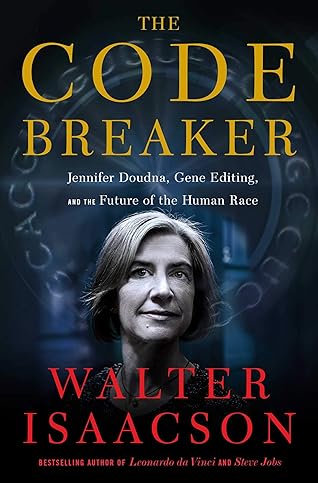More on this book
Community
Kindle Notes & Highlights
Read between
August 5 - August 21, 2022
don’t want to become a chemist if I’m not going to have a shot at being at the top.’ ” She thought about changing her major to French. “I went to talk to my French teacher about that, and she asked what I was majoring in.” When Doudna replied that it was chemistry, the teacher told her to stick with it. “She was really insistent. She said ‘If you major in chemistry you’ll be able to do all sorts of things. If you major in French you will be able to be a French teacher.’ ”2
how nature works. Szostak had a guiding principle: Never do something that a thousand other people are doing. That appealed to Doudna. “It was like when I was on the soccer field and wanted to play a position that the other kids didn’t,” she says. “I learned from Jack that there was more of a risk but also more of a reward if you ventured into a new area.”
The scientist does not study nature because it is useful. He studies it because he takes pleasure in it, and he takes pleasure in it because it is beautiful.
is often the case in the history of science, discoveries can have unexpected applications. “When you do curiosity-driven research, you never know what it may someday lead to,” Mojica says. “Something that’s basic can later have wide consequences.” His prediction to his wife that his name would someday be in history books proved to be correct.
Genentech, a mash-up of “genetic engineering technology.”
In the history of science, there are few real eureka moments, but this came pretty close. “It wasn’t just some gradual process where it slowly dawned on us,” Doudna says. “It was an oh-my-God moment.” When Jinek showed Doudna his data demonstrating that you could program Cas9 with different guide RNAs to cut DNA wherever you desired, they actually paused and looked at each other. “Oh my God, this could be a powerful tool for gene editing,” she declared. In short, they realized that they had developed a means to rewrite the code of life.4
far Doudna’s collaboration with Charpentier had produced two significant advances. The first was the discovery that the tracrRNA played an essential role not just in creating the crRNA guide but, more important, holding it together with the Cas9 enzyme and binding it all to the target DNA for the cutting process. The second was the invention of a way to fuse these two RNAs into a single-guide RNA. By
studying a phenomenon that evolution had taken a billion or so years to perfect in bacteria, they turned nature’s miracle into a tool for humans.
“Healthy rivalries,” she later wrote, “have fueled many of humankind’s greatest discoveries.”1
“If it were not for competitive people like Jennifer, our world would not be as good,” she says. “Because what drives people to do good things is recognition.”3
One substantive issue that came between them is one that historians know all too well. Almost every person in any saga tends to remember their own role as being a little more important than the other players see it. That’s true in our own lives. We recall vividly the brilliance of our own contributions to a discussion; we’re a bit hazier when recalling the contributions of others, or we tend to minimize their significance.
Therein lies one of the problem with patents: they prod people to be less generous in sharing credit.10
Noyce and Kilby obeyed an all-important business maxim: Don’t fight over divvying up the proceeds until you finish robbing the stagecoach.
Doudna recalls one aspect of her father’s personality that used to upset her. Martin Doudna tended to categorize people as good or bad, with little respect for the shadings that most people contain. “He had people that he revered and thought were wonderful and they could do no wrong, and then he had people who were horrible and he disagreed with them on everything, and they could do no right.” Reacting to that, Doudna worked hard to see people in all of their complexity. “I felt like the world is kind of grayscale. There are people who have great qualities, but they also have flaws.”
Tolkien’s Lord of the Rings:
“I wish it need not have happened in my time,” said Frodo. “So do I,” said Gandalf, “and so do all who live to see such times. But that is not for them to decide. All we have to decide is what to do with the time that is given us.”
“The only thing better than winning a Nobel Prize,” he said, “is having one of your students win one.”
honoring CRISPR, a virus-fighting system found in nature, in the midst of a virus pandemic, the Nobel committee reminded us how curiosity-driven basic research can end up having very practical applications. CRISPR and COVID are speeding our entry into a life-science era. Molecules are becoming the new microchips.


